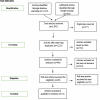A narrative synthesis of illustrative evidence on effects of capitation payment for primary care: lessons for Ghana and other low/middle-income countries
- PMID: 28579626
- PMCID: PMC5443675
- DOI: 10.4314/gmj.v50i4.3
A narrative synthesis of illustrative evidence on effects of capitation payment for primary care: lessons for Ghana and other low/middle-income countries
Abstract
Objective: To analyse and synthesize available international experiences and information on the motivation for, and effects of using capitation as provider payment method in country health systems and lessons and implications for low/middle-income countries.
Methods: We did narrative review and synthesis of the literature on the effects of capitation payment on primary care.
Results: Eleven articles were reviewed. Capitation payment encourages efficiency: drives down cost, serves as critical source of income for providers, promotes adherence to guidelines and policies, encourages providers to work better and give health education to patients. It, however, induces reduction in the quantity and quality of care provided and encourages skimming on inputs, underserving of patients in bad state of health, "dumping" of high risk patients and negatively affect patient-provider relationship.
Conclusion: The illustrative evidence adduced from the review demonstrates that capitation payment in primary care can create positive incentives but could also elicit un-intended effects. However, due to differences in country context, policy makers in Ghana and other low/middle-income countries may only be guided by the illustrative evidence in their design of a context-specific capitation payment for primary care.
Funding: Netherlands Fellowship Programme (NFP), Fellowship number: NFP-PhD.12/352.
Keywords: Capitation payment; Ghana; cost-containment; national health insurance; primary care.
Conflict of interest statement
Conflict of interest: None declared
Figures
Similar articles
-
Does a provider payment method affect membership retention in a health insurance scheme? a mixed method study of Ghana's capitation payment for primary care.BMC Health Serv Res. 2018 Jan 30;18(1):52. doi: 10.1186/s12913-018-2859-6. BMC Health Serv Res. 2018. PMID: 29378567 Free PMC article. Review.
-
Does capitation payment under national health insurance affect subscribers' trust in their primary care provider? a cross-sectional survey of insurance subscribers in Ghana.BMC Health Serv Res. 2016 Aug 24;16(1):437. doi: 10.1186/s12913-016-1622-0. BMC Health Serv Res. 2016. PMID: 27557551 Free PMC article.
-
Provider preference for payment method under a national health insurance scheme: A survey of health insurance-credentialed health care providers in Ghana.PLoS One. 2019 Aug 26;14(8):e0221195. doi: 10.1371/journal.pone.0221195. eCollection 2019. PLoS One. 2019. PMID: 31449530 Free PMC article.
-
Financial sustainability versus access and quality in a challenged health system: an examination of the capitation policy debate in Ghana.Health Policy Plan. 2016 Nov;31(9):1240-9. doi: 10.1093/heapol/czw058. Epub 2016 May 13. Health Policy Plan. 2016. PMID: 27178747
-
Effectiveness of hospital payment reforms in low- and middle-income countries: a systematic review.Health Policy Plan. 2021 Sep 9;36(8):1344-1356. doi: 10.1093/heapol/czab050. Health Policy Plan. 2021. PMID: 33954776
Cited by
-
Global landscape of community pharmacy services remuneration: a narrative synthesis of the literature.J Pharm Policy Pract. 2023 Oct 9;16(1):118. doi: 10.1186/s40545-023-00626-0. J Pharm Policy Pract. 2023. PMID: 37814349 Free PMC article. Review.
-
Exploring the roles of players in strategic purchasing for healthcare in Africa-a scoping review.Health Policy Plan. 2023 Jan 6;38(1):97-108. doi: 10.1093/heapol/czac093. Health Policy Plan. 2023. PMID: 36318330 Free PMC article.
-
Does a provider payment method affect membership retention in a health insurance scheme? a mixed method study of Ghana's capitation payment for primary care.BMC Health Serv Res. 2018 Jan 30;18(1):52. doi: 10.1186/s12913-018-2859-6. BMC Health Serv Res. 2018. PMID: 29378567 Free PMC article. Review.
-
The Experiences of Strategic Purchasing of Healthcare in Nine Middle-Income Countries: A Systematic Qualitative Review.Int J Health Policy Manag. 2023;12:7352. doi: 10.34172/ijhpm.2023.7352. Epub 2023 Nov 6. Int J Health Policy Manag. 2023. PMID: 38618795 Free PMC article.
-
Using Health Systems and Policy Research to Achieve Universal Health Coverage in Ghana.Glob Health Sci Pract. 2022 Sep 15;10(Suppl 1):e2100763. doi: 10.9745/GHSP-D-21-00763. Print 2022 Sep 15. Glob Health Sci Pract. 2022. PMID: 36109062 Free PMC article.
References
-
- Park M, Braun T, Carrin G, Evans D, editors. World Health Organization, author. Provider payments and cost-containment: lessons from OECD countries. Technical brief for policy-makers (2) World Health Organization; 2007. [28 May 2015]. pp. 1–7. [Internet] Available from: http://www.who.int.
-
- Jegers M, Kesteloot K, De Graeve D, Gilles W. A typology for provider payment systems in health care. Health Policy (New York) 2002;60(3):255–273. - PubMed
-
- Duckett SJ. Hospital payment arrangements to encourage efficiency: the case of Victoria, Australia. Health Policy (New York) 1995;34(2):113–134. - PubMed
-
- Preker AS, Langenbrunner JC, editors. The International Bank for Reconstruction/World, author. Spending wisely. Buying health services for the poor. Washington DC: The World Bank; 2005.
-
- Petersen LA, Woodard LD, Urech T, Daw C, Sookanan S. Does Pay-for-Performance Improve the Quality of Health Care? Ann Intern Med. 2006;145(4):265–272. - PubMed
Publication types
MeSH terms
LinkOut - more resources
Full Text Sources
Research Materials

